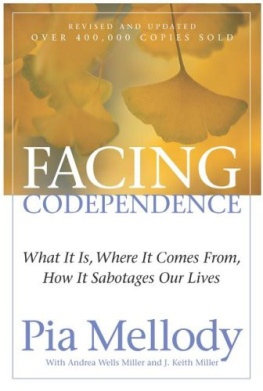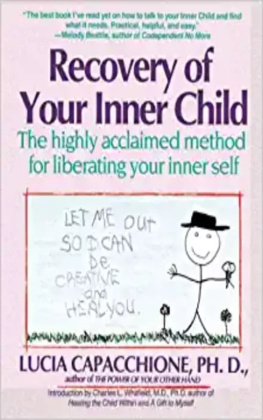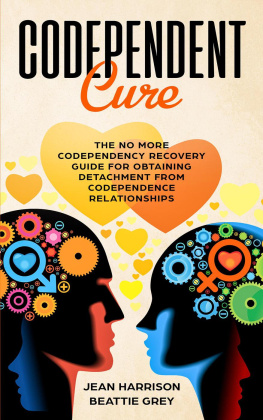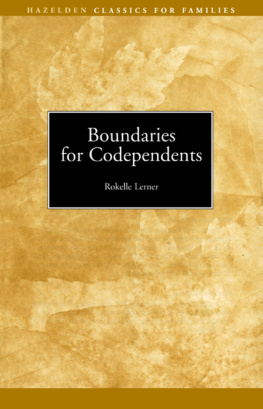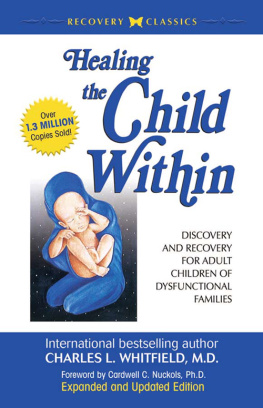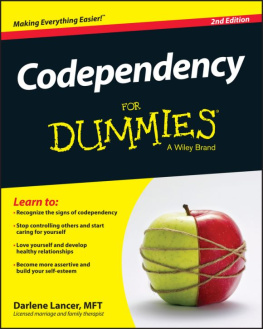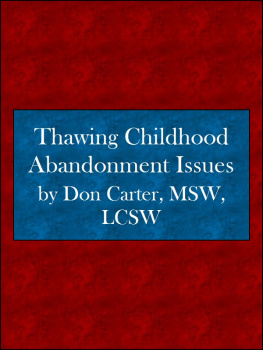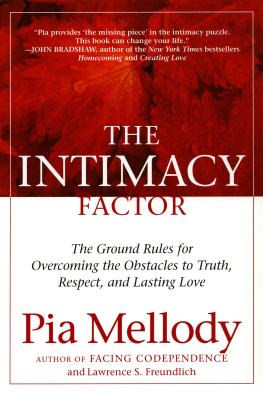| Facing Codependence: What It Is, Where It Comes From, How It Sabotages Our Lives |
| Pia Mellody & Andrea Wells Miller & J. Keith Miller |
| HarperCollins (1989) |
|
| Tags: | Codependency, Self-Help |
| Codependencyttt Self-Helpttt |
Pia Mellody creates a framework for identifying codependent thinking, emotions and behaviour and provides an effective approach to recovery. Mellody sets forth five primary adult symptoms of this crippling condition, then traces their origin to emotional, spiritual, intellectual, physical and sexual abuses that occur in childhood. Central to Mellody's approach is the concept that the codependent adult's injured inner child needs healing. Recovery from codependence, therefore, involves clearing up the toxic emotions left over from these painful childhood experiences.
FACING CODEPENDENCE
By Pia MELLODY
FACING CODEPENDENCE)
What It Is, Where It Comes From, How It Sabotages Our Lives
With Andrea Wells Miller and Keith Miller
PERENNIAL LIBRARY
Harper & Row, Publishers, San Francisco
New York, Grand Rapids, Philadelphia, St. Louis London, Singapore, Sydney, Tokyo, Toronto
FACING CODEPENDENCE: What It Is, Where It Comes From, How It Sabotages Our Lives. Copyright @ 1989 by Pia Mellody, Andrea Wells Miller, and J. Keith Miller. All rights reserved. Printed in the United States of America. No part of this book may be used or
reproduced in any manner whatsoever without written permission except in the case of brief quotations embodied in critical articles and reviews. For information address Harper & Row, Publishers, Inc., 10 East 53rd Street, New York, N.Y. 10022.
FIRST EDITION
Library of Congress Cataloging-in-Publication Data
Mellody, Pia.
Facing Codependence.
1. Codependence (Psychology) 1. Miller, Andrea Wells. II. Miller, Keith. In. Title. RC569.5.C63M45 1989 616.86 88-45662 ISBN 0-06-250589-0
89 90 91 92 93 MAL 10 9 8 6 5 4
To Jane Kiarny, my surrogate mom,
who first showed me my lack of understanding that I am precious. She tenderly and repeatedly confronted me about the fact that I am lovable, cherished me when I couldnt love myself, and shared with me how her family nurtured her as she developed her own sense
of preciousness.
Contents
Foreword by Andrea Wells Miller and J. Keith Miller
Acknowledgements
Introduction: How It All Began
PART 1: The Symptoms of Codependence
1. Facing Codependence
2. The Five Core Symptoms of Codependence
3. How the Symptoms Sabotage Our Lives
PART 2: The Nature of a Child
4. A Precious Child in a Functional Family
5. A Precious Child in a Dysfunctional Family
6. The Emotional Damage of Abuse
7. From Generation to Generation
PART 3: The Roots of Codependence
8. Facing Abuse
9. Defenses Against Recognizing Abuse
10. Physical Abuse
11. Sexual Abuse
12. Emotional Abuse
VIII / FACING CODEPENDENCE
13. Intellectual Abuse
14. Spiritual Abuse
PART 4: Moving Toward Recovery
15. Personal Recovery
Appendix: A Brief History of Codependence
and a Look at the Psychological Literature 207
Index 219
Foreword
In certain men and women normal human feelings such as shame, fear, pain, and anger are so magnified that these people are almost always in an emotional state marked by anxiety and feelings of being irrational, dysfunctional, and/or crazy. Such people also think they should be able to make those around them happy, and when they cant, they feel as if they are somehow less than others.
These people often find themselves overreacting to everyday happenings, experiencing feelings far more excessive than appropriate for a given situation. For example, when something frightening happens, instead of normal fear, they experience panic or
anxiety attacks. These attacks can also occur for no reason When some of lifes normal pain comes their way, their experience may be deep despair, hopelessness, or perhaps suicidal thoughts or
behavior. And when a situation arises that would ordinarily provoke some genuine appropriate anger, such people sometimes explode into volcanic rage. And during these extreme emotional experiences, they often think, Why does he treat me this way? Doesnt he know how painful it is to me? But they cannot control the emotional outbursts and are baffled.
These intense emotional reactions often occur over lifes less dramatic experiences, such as a disagreement with ones spouse over which movie to see or where to go on vacation. Despair or rage
X / FACING CODEPENDENCE
can be triggered by the disappointment of interviewing for a job and not being hired, the sadness of a good friends moving to another town, or the anger of the neighbors dog messing up the flower bed. Any of these experiences can evoke emotional reactions that are far from moderate-they can range from intense explosive feelings to bland sweetness and lack of any emotional expression at all. But both of these seemingly uncontrollable reactions sabotage the lives and relationships of such people.
There is now much documented evidence pointing to the fact that the physical stress of living with pent-up or explosive feelings may contribute to physical disorders such as high blood pressure, heart disease, arthritis, migraine headaches, cancer, and others. This emotional factor of codependence can sabotage our health as well as our relationships.
And yet these men and women operate as if they believe that only by being perfect in all they do or by pleasing the people around them can they calm the outsized, uncontrollable, and irrational feelings that tyrannize them. They live in the delusion that the bad feelings (that they sometimes find almost overwhelming) can be quelled if they can just do it better or win the approval of certain important people in their lives. By this attitude they unconsciously make those people important and their approval responsible for their own happiness. When those they try to please dont appreciate what Im doing for them and will not give the crucial approval, the emotionally tyrannized individuals become furious. But since the good opinion of the would-be approval giver is so important, this rage must be repressed. And although this rage isnt shown directly, the anger may come out sideways, in sarcasm, forgetfulness, hostile jokes, or other passive-aggressive behaviors.
Often such men and women appear to be gentle and helpful. A closer examination, however, reveals in them a powerful need to control and manipulate those around them into giving them the approval they believe they need to subdue their overwhelming feelings. But all their efforts are of no use in the long run, because no
FOREWORD / XI
one can take away the overwhelming part of their feelings. They may come to believe there is no hope for them.
On the other hand, in some people with quite similar backgrounds, a very different thing happens. The normal human emotions are so minimized that they hardly experience any feelings at all -no fear, no pain, no anger, no shame, and also no joy, no pleasure, no contentment. They shuffle numbly through life from one
day to the next.
It was actually the families of alcoholics and other chemically dependent people who brought these two clusters of symptoms to the attention of therapists in treatment centers. These family members all seemed to be plagued with intensified feelings of shame, fear, anger, and pain in their relationships with the alcoholic or
addict who was the focal point of their family. But they often were

